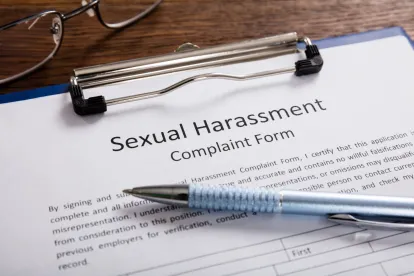Texas has taken aim at sexual harassment in the workplace. In a bold move by the Texas legislature, a new sexual harassment law (effective September 1, 2021) expands the definition of sexual harassment, heightens the standard of an employer’s response to complaints, and places responsibility on individuals, rather than just companies, for failing to address sexual harassment.
Why the new harassment law is significant.
The new law makes sweeping changes to the definition of sexual harassment, as well as who can be liable for sexual harassment and a company’s obligations to prevent sexual harassment. It also increases the time an employee has to file a claim of sexual harassment with the Texas Workforce Commission. Importantly, the law does not address harassment based on any other protected class, such as age, disability, or race. The failure to add harassment based on other protected classes indicates the legislature was focused on the sex-based nature of workplace activity that precludes victims from advancing.
Sexual harassment is now defined as any sexual physical or verbal act that “has the purpose or effect of creating an intimidating, hostile or offensive working environment.” The inclusion of an “intimidating” working environment seems to lower the bar for harassment complainants.
Directors, Managers, Supervisors and Other Individuals are now personally liable for sexual harassment.
Federal sexual harassment law has never extended liability to individuals. Instead, federal law limits liability to business entities. Under Texas law, a “person that acts directly in the interest of the employer in relation to the employee” may be liable for failing to adequately address sexual harassment that “reasonably interferes with an employee’s work performance.” Although these terms have not yet been defined, it is reasonable to expect that contractors, managers, and co-workers could be liable for failing to address sexual harassment.
Individuals and business entities would likely be jointly and severally liable for sexual harassment damages in Texas. This means individuals face the same responsibility to pay for money damages as their employers. The Texas Labor Code provides that compensatory damages (emotional distress and punitive damages) are awarded for “each complainant”, rather than each defendant, signaling a joint award. Therefore, attorneys’ representing sexual harassment plaintiffs will not see additional damages for adding individuals to sexual harassment lawsuits but will likely have more leverage in discovery and at trial.
Employees have a greater opportunity to complain.
The new law expands coverage to all business entities regardless of the number of employees, unlike the federal discrimination law threshold of fifteen employees. And, Texas employees have longer to file a claim with the Texas Workforce Commission, now 300 days from the alleged act, which is 120 days longer than the limitation for other discrimination claims. One question is whether the federal legal theory of a continuing violation will apply to the new Texas law. Under the continuing violation theory, employees can bring complaints for years of alleged harassing acts that would have otherwise been banned by limitations as long as one act occurs within the statutory 300 day period. So, while the law may be effective only for acts occurring after September 1, 2021, companies still risk a resurgence of older complaints.
Liability for business entities and individuals may be easier under the new law.
In a nutshell, Texas law has flipped the prior law on its head. Under the new Texas law, liability attaches if sexual harassment has taken place and “the employer or the employer’s agents or supervisors: (1) know or should have known that the conduct constituting sexual harassment was occurring; and (2) fail to take immediate and appropriate corrective action.” The new requirement is opposite of the prior law. Under the prior law, an employer could avoid a sexual harassment claim by proving the company took “prompt remedial action” in response to the sexual harassment complaint. The new law requires this action upfront. Also, the term “immediate and appropriate corrective action” is different from the prior “prompt remedial action” defense and indicates a heightened standard is required for employers.
Immediate steps Employers should take.
Given that the new sexual harassment law is already in effect, employers should act fast. First, training is a must. The new standard of liability requires that employees and managers be able to identify sexual harassment and respond to such conduct immediately. Online training portals and written training materials are available to reach employees working remotely or on shifts. Records of the materials used for training and confirmation of completed training should be preserved so that these documents can be used in the event of a charge or a lawsuit. Managers and supervisors, as well as contractors dealing directly with employees, should be informed of the personal liability that now attaches to sexual harassment claims. Finally, investigations of complaints are now more important than ever. Companies should provide training and procedures for effective investigations or promptly contact counsel or a third-party human resources consultant to assist with an investigation. Proper documentation of an investigation is now a requirement to defend against sexual harassment claims in Texas.
Sexual harassment has been prohibited for many years and workplace culture has seen significant improvements due to sexual harassment laws and training. Notwithstanding, the new Texas sexual harassment law emphasizes the zero-tolerance mindset of the general public. Employers should take heed and implement effective policies and training now to avoid liability for themselves and their employees in the future.




 />i
/>i

